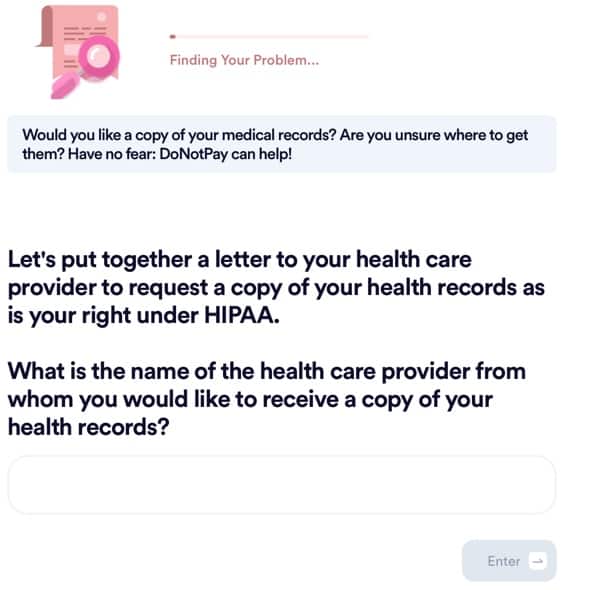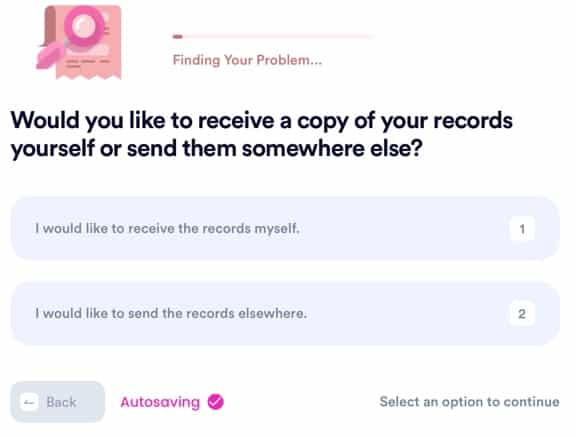How to Request Emerson Hospital Medical Records In 3 Easy Steps
Everyone should know that Federal law protects your right to gain access to your . The official name of the Federal law that protects your access and privacy rights in your health record is the Health Insurance Portability and Accountability Act of 1996. That's a mouthful, so you will hear it more popularly referred to as "HIPAA".
Patients have various reasons for wanting to see their medical records. Whatever the reason, the law guarantees your right to obtain a copy of your medical records for review and/or transfer to another hospital or medical practice. DoNotPay.com makes it easy.
Why Might I Need Medical Records from Emerson Hospital?
A study in 2017 revealed that millennials, boomers, and Gen Xers all appear more comfortable in changing their medical providers than their parents were. The most common reason patients change doctors or other medical providers is to have better communications and more convenience.
Patients may have other reasons for wanting access to their personal medical records at Emerson Hospital and other facilities, such as:
- If the patient's doctor retires, it is imperative to transfer medical records as soon as humanly possible.
- The patient may want to change to a new doctor and that doctor will need the patient's prior medical records.
- Patients should keep copies of their medical records, so they can ensure they won't receive unnecessary surgical procedures or in the event of an emergency while traveling.
- Patients often want a copy of their electronic health records to have on hand for time-sensitive situations.
- Patients may need to update their personal health information so that medical providers and people with power of attorney can make appropriate and swift decisions on their behalf when they no longer have the capacity to do so.
When you or your family decide to make changes in medical providers for whatever reason, viewing your medical records and transferring them to new providers is your right.
What Types of Medical Records are Restricted from Being Released?
Under HIPAA's Privacy Rule, patients have the right to request that medical providers restrict access to their medical records. The patient's right to request restricted access applies to personal health information related to:
- Treatment, payment, or health care operations; and
- Information other than disclosures is permitted under federal law.
When a hospital agrees to the patient's request for restricted access, they will not disclose the personal health information except in the event of emergency medical treatment for the patient. The emergency care provider must not further disclose the restricted information to another entity.
The release of medical records comes under state law jurisdiction as well as Federal. HIPAA is the controlling federal law for the dissemination of personal health information, but California and New York have state laws that are in some ways more protective than HIPAA. State laws that are more protective of individual privacy rights than HIPAA take precedence over HIPAA's privacy rules. A state's privacy rules cannot offer less protection than HIPAA.
When it comes to minors over age 15, hospitals and healthcare providers require that the minor sign a records release form before they will disclose personal health information.
Caregivers, on the other hand, need general information about the patient's health status in order to care for them properly without a records release form.
How to Get Medical Records From Emerson Hospital?
It is not always easy to get your medical records from a hospital or other medical provider. You may not know who to ask, and you may feel you are getting the run-around when you try to assert your rights. Unfortunately, medical staff do not always know patient rights with respect to their health record information.
Emerson Hospital's online Medical Records section contains important information about the hospital's policy on medical record retention and how patients can get their medical records. Patients should know that Emerson Hospital:
- Keeps patient medical records for 20 years;
- Has an online form for patients to request medical records;
- Requires a digital image of the state-issued ID to accompany an online medical records request;
- Also permits medical record requests by printing out the online form and sending via fax at 978-287-3652 or email @ roi@emersonhosp.org.
| Mail the printable | U.S. Mail to: MEDICAL RECORDS DEPARTMENT, Emerson Hospital, 133 ORNAC, Concord, MA 01742. |
| Electronic records | The Medical Records section says that the hospital may charge a fee. For further details, call 978-287-3907 or email roi@emersonhosp.org. |
Get Copies of Your Emerson Hospital Medical Record With DoNotPay
DoNotPay is the automated, web-based platform that makes it easy and fast to obtain your Emerson Hospital medical record.
DoNotPay knows how to write your health care provider a simple, clear, and effective letter that will get your legally-guaranteed health records for you in no time.
The DoNotPay process takes three steps:
- Look up medical records on DoNotPay's website.

- Enter the name of the health care provider you'd like to receive medical records from.

- Answer a few questions about your provider and where you'd like to send the records.

DoNotPay Works across Companies
DoNotPay is the way to obtain medical records for other companies, too:
- Kaiser Medical Records
- Mercy Medical Records
- Baptist Medical Records
- Cleveland Clinic Medical Records
And DoNotPay works nationally to help you get records as easily in Alaska as you can in New York City.
Does DoNotPay Do Other Stuff?
Helping you obtain your medical records is just one of many ways that DoNotPay can help you resolve customer issues. Check out the following topics to see what interests you:
Some content series that you could link to include:
- Advance Healthcare Directives
- File a Complaint
- Request Sick Leave
- Learn How to Get Birth Certificates
- Learn How to File in Small Claims Court
- Learn medical records
- Electronic health records
- How to request medical records
- How to get my medical records
Visit 's website today. Learn about other consumer issues that DoNotPay can help resolve. Make DoNotPay your resource for all your consumer's questions.


